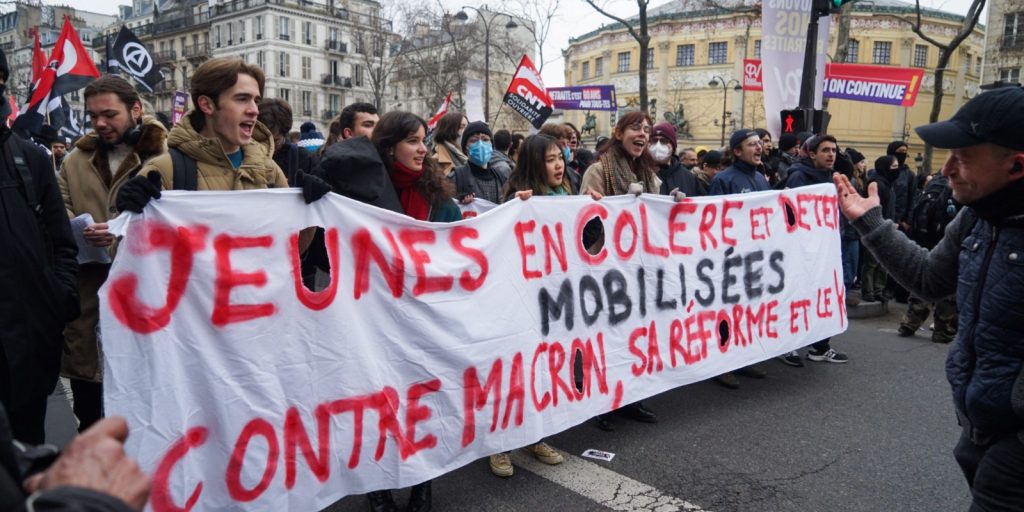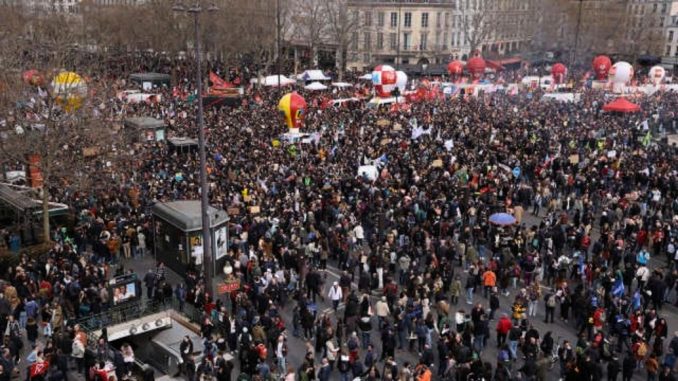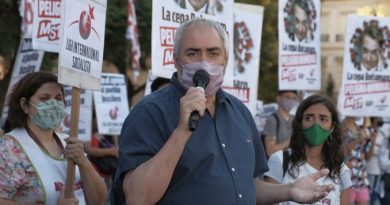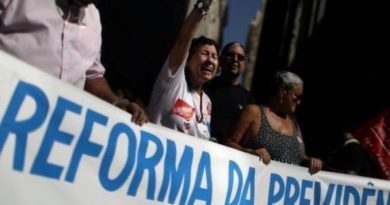France: intensifies the fight against the anti-retirement reform
ByLIS France
He 16 of March, by order of President Macron and to circumvent the debate in the lower house, its prime minister Borne appealed to the constitutional article 49.3 and decreed the anti-worker retirement reform that raises 64 years the retirement age and 43 the years of contribution to collect the minimum credit. If a parliamentary motion of no confidence in the government does not prosper, the reform would be applied by the end of the year. But while this happens at the institutional level, the streets of all France confirm that despite the police repression the workers and popular struggle continues. We are facing a major political crisis that far exceeds the retirement issue.
The official excuse for imposing this reform is the supposed budget deficit that would affect the pension funds of France in the year 2030. Of course, Macron's capitalist government in no way dares to increase employer contributions: his adjustment is directed against the working class.
But in addition to raising the retirement age by two years and by one year the amount of contributions necessary to be able to access the minimum pension of just 1.200 euros per month, This reform annuls several special pension schemes for unhealthy tasks or great work wear. That is to say, It's a full line attack.
If already today a quarter of the most precarious workers die before reaching the 62 years, What is the current retirement age?, for millions more people this reform would concretely imply working until death or dying working. Hence, it reaps the firm rejection of almost the 75% among the general population and more than 90% among the wage earners.
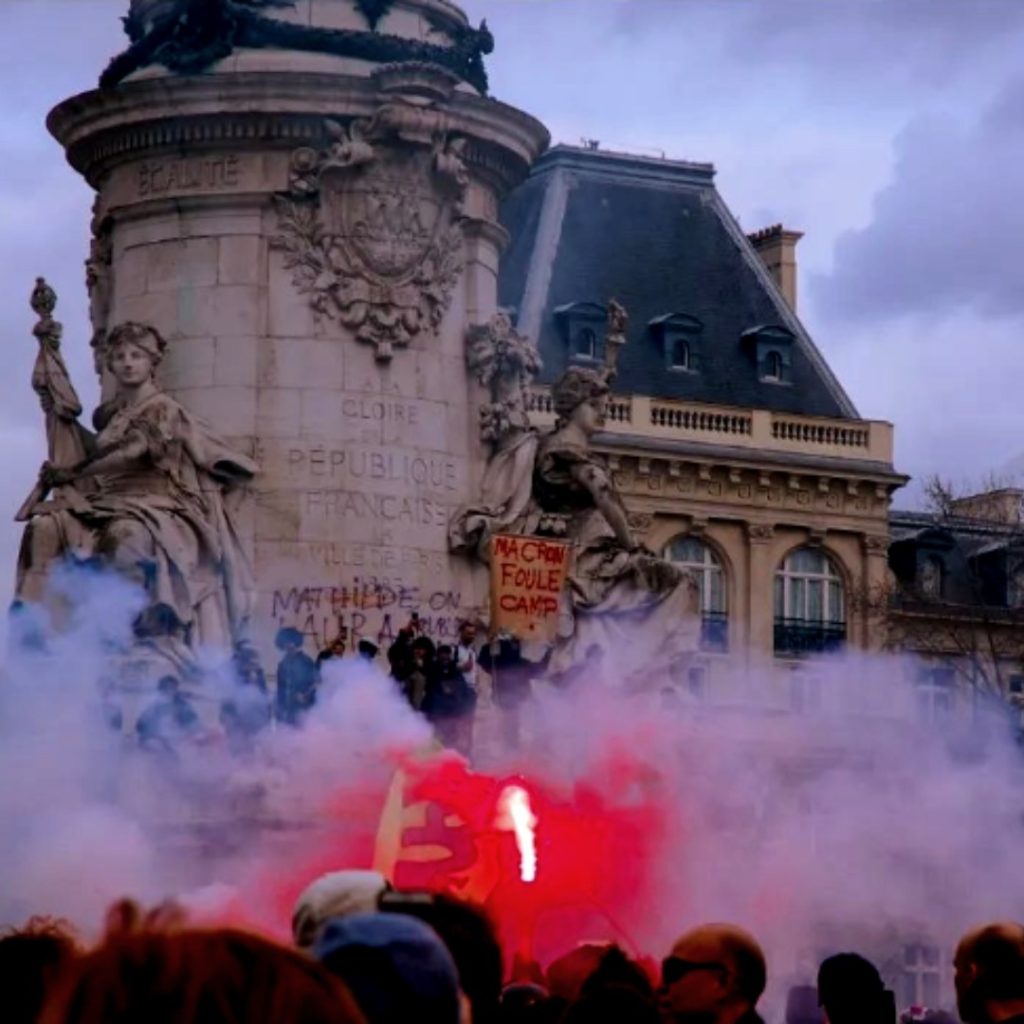
Macron-Borne throw gasoline on the fire
When did the reform debate begin?, two months ago, the government had guaranteed favorable votes in the Senate and also in the Assembly. As is often the case all over the world, the senators, more reactionary, they approved it. But as the days go by, and especially of the strikes and the massive marches, the government found it difficult to calculate the vote in the lower house. That is why he appealed to the decree through the 49.3.
But it was like throwing gasoline on the fire, because if this reform was already illegitimate in the eyes of popular opinion, now it also lacks the tricky parliamentary "legitimacy" of bourgeois democracy. The motion of no confidence in the government will be debated from Monday 27, but it is difficult for it to be approved and the same with a possible appeal of the reform before the Constitutional Council. And neither would a hypothetical referendum be the outcome., very complicated call, that promote from the rightist Le Pen (RN) to the center-leftist Mélenchon (FI) seeking to divert the street fight to the institutional-electoral level: the streets have already given and continue to give their negative verdict on the reform.
As soon as the news of Borne's decree was known, with youth at the forefront, thousands and thousands of people spontaneously came out to express their repudiation in Paris and in numerous cities in the French interior. Yellow vests and radical groups participated. There was burning of containers, breaking windows and other incidents, harsh confrontations with the police forces - who used gases and rubber bullets -, injured and dozens of arrests. In the days that followed, the number of detainees rose to a thousand., as reported by Amnesty International.
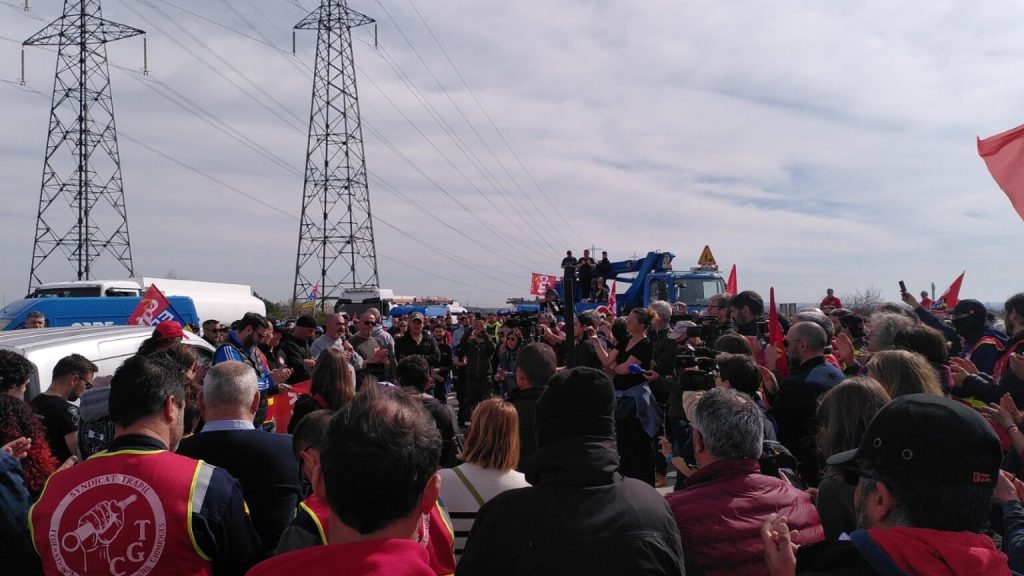
Of the 23 al 28…¿and then? For the indefinite general strike!
He 22, Macron spoke on TV and reaffirmed his reform, which fueled even more the ninth national day of struggle of the 23 summoned by the Intersindical. The strike was partial, greater between railways and other transport, trash collectors (with high impact effect), oil refiners (despite the summons), port workers (that blocked ports), energy (who made cuts) and educational sectors. Once again, the streets overflowed even in small towns. More than a million people mobilized according to the Ministry of the Interior and more than 3,5 million according to the organizers. just in case, the British king had to cancel his visit to France...
It is that in France there is not only a lot of anger against the reform, but also because of the inflation that does not stop, low wages and pensions, as well as the lack of personnel in public services and the constant precariousness of working conditions. In sum, we are facing a general illegitimacy of the Macron government and its austerity plan, which means a major political crisis. That is why it is not by chance that in the marches people begin to hear“Get out Macron!!”
It is this powerful worker and popular pressure from below that obliges the bureaucracies of the eight centrals grouped in the Intersindical to continue calling actions. Added to this is the growing youth drive of the student movement, that coordinates in high schools and interfaculty assemblies. As an alert to consider, in Paris an extreme right group attacked one of the student rallies.
In this frame, the next national strike with mobilization, the tenth round, is scheduled for Tuesday 28. But the Intersindical, while supporting the cheating of a referendum, continues to refuse to call a general strike for an indefinite period, ignoring the demands of some unions and all combative trade union activism to defeat the reform and put the government itself on the ropes.
"Today on the street, We'll continue tomorrow"
As the statement of the 24 March of the revolutionary wing of the NPA, party in which we are active: "In the coming days many and many will fight hard so that the impetus given by this new day of the 23 be transformed into renewable strikes, hopefully in a general strike whose slogan is widely chanted in the marches. workers, activists and youth are already debating, in their organizational structures of the movement (strikers assemblies, mobilization committees, ‘interpros’, secondary student committees and 'interfacs' -such as the national student coordination that will meet this weekend in Grenoble)… To involve everyone, together. There is no shortage of proposals for collective action to bring new sectors to the fight, coordinate, act and above all decide together the continuity of the movement, arm themselves to react together against Macron and his police, as against the Intersindical -if necessary. What is surely still missing in this movement is more organization among those who are its protagonists, more of their own decision-making bodies through which they can coordinate... to win.
"Today on the street, We will continue tomorrow… What is on the agenda are the best means of this struggle and collective organization. until win!”
